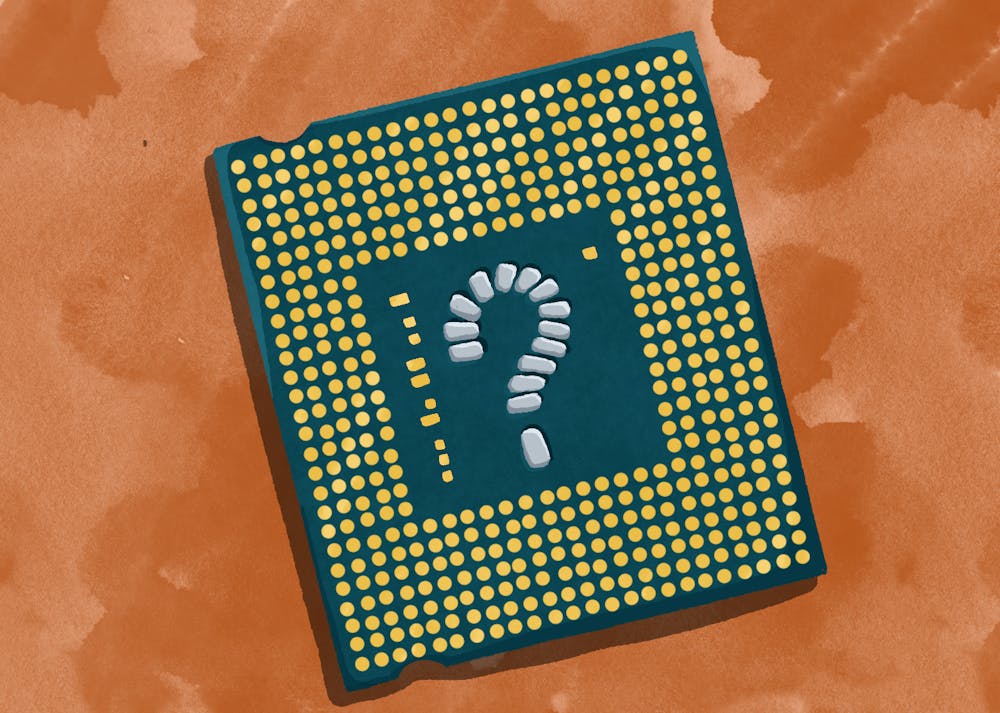Arizona's rising semiconductor manufacturing industry was the prime focus for engineering experts and politicians during the seventh annual ASU Congressional Conference, hosted at the Tempe campus on Aug. 15.
The official theme of the conference, "Advancing Arizona's Technological Competitiveness," included speeches and panels held by state leaders, professors and ASU President Michael Crow.
Whether virtually or in-person, various prominent political figures made an appearance at the conference. This ranged from remarks from Gov. Katie Hobbs, Rep. Debbie Lesko (R-Peoria) and Sens. Mark Kelly (D-Ariz.) and Kyrsten Sinema (I-Ariz.), to discussions moderated by Reps. Andy Biggs (R-Gilbert), Greg Stanton, (D-Phoenix) and Juan Ciscomani (R-Tucson).
Dave White, associate vice president for research advancement at ASU, said he has participated in the conference for a number of years as both a speaker and an organizer. He and his team currently work with ASU’s Fulton School of Engineering to maximize computer chip production, specifically for semiconductors, in ways using the least amount of water.
White said collaboration between the public and private sector is essential to "driving innovation forward" in a way that reduces water usage in manufacturing. With climate change and sustainable manufacturing becoming an increasingly prevalent issue, White said water conservation is especially critical to Arizona.
He said he leads the Arizona Water Innovation Initiative, a new statewide effort to "develop solutions, new approaches and new innovations for water resilience."
"My focus in this particular conversation was really around the issue of water security and water resilience in Arizona," White said.
Semiconductor manufacturing requires a lot of water, something that makes the industry a determining factor in the state's water security. White said water is a "principal resource input" in the process of engineering semiconductors.
"Water resilience and water security is an essential foundational component of technological innovation in general and semiconductor manufacturing in particular," White said.
Another goal of the conference was finding ways to generally reduce emissions created by manufacturing all kinds of infrastructure, such as heavier equipment.
Sridhar Seetharaman, a professor at the Fulton school and vice dean for research and innovation, is a leader in the development of Electrified Processes for Industry Without Carbon, or EPIXC.
He said EPIXC focuses on using more electricity to power manufacturing instead of power sources like the combustion of fossil fuels to "counteract greenhouse emissions." He said heavy industries, which manufacture large equipment and infrastructure, are responsible for 30% of greenhouse gas emissions.
"EPIXC is looking at electrifying industry," Seetharaman said. "If you can replace that heat with electric heating technologies, you can pretty much eliminate all of the greenhouse gas emissions from those industries."
John Fowler, a senior global futures scientist and Motorola professor of international management, is an expert on the supply chain management facet of semiconductor manufacturing. He said in order to remain competitive in the semiconductor manufacturing industry, it needs to "reduce the time and cost it takes to make them."
Fowler said that ensuring successful output involves inspecting the factories as well as looking into the global supply chain. There are three main levels of personnel required for semiconductor manufacturing: engineering talent — chemical engineers and electrical engineers, among others — manufacturing experts and supply chain managers.
He said it is a difficult job, and requires a high level of education. However, there are open jobs on all levels of manufacturing.
"One of the big takeaways of this panel, which you hit on, was the need for labor and STEM education," Fowler said.
Edited by Shane Brennan, Alexis Waiss and Grace Copperthite.
Reach the reporter at brenna.gauchat@gmail.com and follow @brenngauchat on X.
Like The State Press on Facebook and follow @statepress on X.




